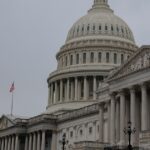
Accusers of the late Jeffrey Epstein say there’s a not-so-secret network of institutions that benefited from the disgraced financier’s sex-trafficking operations.
On Thursday, two of Epstein’s accusers filed separate lawsuits against two huge banking concerns, Deutsche Bank AG and JPMorgan Chase & Co. According to Fox Business, the alleged victims say the banks benefited from the convicted sex trafficker’s predations by “assisting, supporting, facilitating, and otherwise providing the most critical service for the Jeffrey Epstein sex trafficking organization to successfully rape, sexually assault, and coercively sex traffic.”
The women behind the lawsuits, who are anonymous in legal documents, filed the actions in the U.S. District Court for the Southern District of New York.
Both lawsuits seek class-action status, according to the New York Post.
The women claim that both banks were complicit in giving Epstein an “appearance of legitimacy,” according to Fox, and that his sex-trafficking wouldn’t have been possible without their assistance.
The suits also claim both banks knew Epstein’s pattern of sex trafficking.
Suffice it to say neither bank is saying the alleged victims have a good argument on their hands.
Deutsche Bank outright denied the claims: “We believe this claim lacks merit and will present our arguments in court,” a statement from the bank said, according to Fox.
However, according to a CNN report Friday, Deutsche Bank had acknowledged in a 2020 statement the “error of onboarding Epstein in 2013 and the weaknesses in our processes, and have learnt from our mistakes and shortcomings.”
Are there more people involved in the Epstein network who need to face justice?
Yes: 0% (0 Votes)
No: 0% (0 Votes)
JPMorgan, meanwhile, said it wouldn’t comment on pending litigation, according to Fox.
If accurate, the timelines laid out by the lawsuits paint a grim picture of what financial institutions allegedly knew about Epstein’s trafficking of underage girls — a crime he was awaiting trial for when he died in a federal prison cell in 2019 in what was ruled a suicide. (His longtime girlfriend, Ghislaine Maxwell, was later convicted for helping him procure girls.)
CNN reported that, according to the language in the lawsuits, JPMorgan allegedly “provided special treatment to the sex-trafficking venture, thereby ensuring its continued operation and sexual abuse and sex-trafficking of young women and girls.”
“Without the financial institution’s participation, Epstein’s sex trafficking scheme could not have existed,” the suit states, according to CNN.
The second lawsuit states that JPMorgan began “separating itself from Epstein” in 2013.
That’s when Deutsche Bank “became the bank that Epstein needed to fund his sexual abuse and sex-trafficking operation.”
“Knowing that they would earn millions of dollars from facilitating Epstein’s sex trafficking, and from its relationship with Epstein, Deutsche Bank chose profit over following the law,” the lawsuit states, according to CNN.
“Specifically, Deutsche Bank chose facilitating a sex trafficking operation in order to churn profits.”
Women who accused Jeffrey Epstein of abuse are suing JPMorgan and Deutsche Bank, saying they facilitated his alleged sex-trafficking operation https://t.co/Hn7W7HzK3f
— The Wall Street Journal (@WSJ) November 24, 2022
“Without Deutsche Bank’s assistance, Epstein could not have abused or trafficked the dozens of young women he did between 2013 and 2018,” the suit states, according to CNN.
The U.K. Daily Mail reported that the suit alleges Deutsche Bank’s knowledge ran a bit deeper.
“Deutsche Bank also knew that Epstein would use means of force, threats of force, fraud, abuse of legal process, exploitation of power disparity, and a variety of other forms of coercion to cause young women and girls to engage in commercial sex acts,” the suit states, according to the Daily Mail.
“Deutsche Bank also engaged in repeated acts of racketeering activity to support the Epstein organization. Knowing that they would earn millions of dollars from facilitating Epstein’s sex trafficking, and from its relationship with Epstein, Deutsche Bank chose profit over following the law.”
This obviously falls into the “big if true” category, with a heavy emphasis on the “if.”
However, Deutsche Bank was fined $150 million by New York state regulators in 2020 after, among other things, they found the bank knew “Epstein paid women’s tuition and gave suspicious payments to Russian models and women with Eastern European names,” according to the Daily Mail. “The bank had a responsibility to monitor his accounts because he was a registered sex offender.”
At the very least, it’s another reminder the establishment didn’t take Epstein’s crimes seriously until the gravity of them became starkly apparent to anyone who bothered to pay attention.






